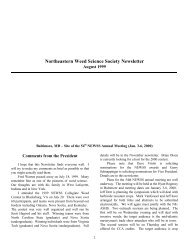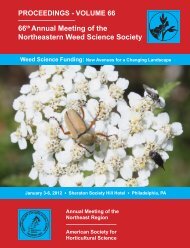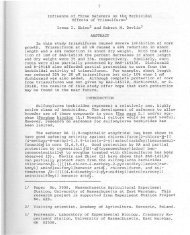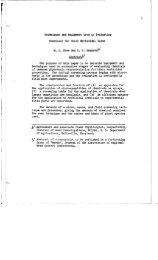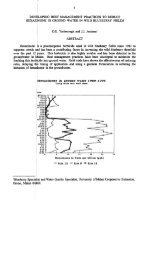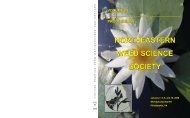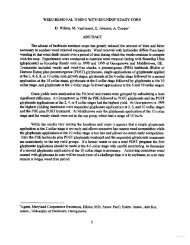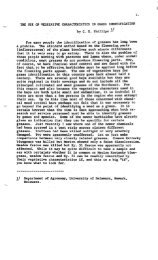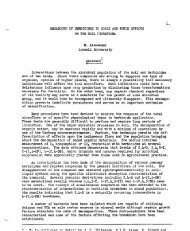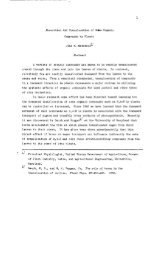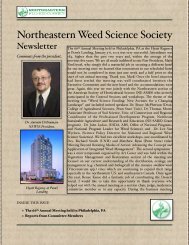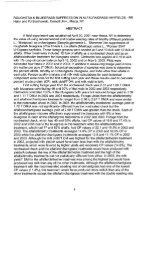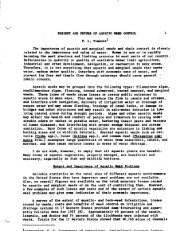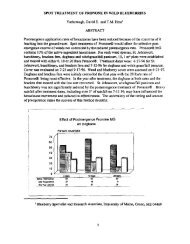Proceedings of the Sixty-first Annual Meeting of the Northeastern ...
Proceedings of the Sixty-first Annual Meeting of the Northeastern ...
Proceedings of the Sixty-first Annual Meeting of the Northeastern ...
Create successful ePaper yourself
Turn your PDF publications into a flip-book with our unique Google optimized e-Paper software.
148<br />
THE 2002 FARM BILL AND ITS EFFECT ON INVASIVE PLANT MANAGEMENT IN<br />
NEW ENGLAND. A. Lipsky, USDA/NRCS, Warwick, RI.<br />
ABSTRACT<br />
The U.S Department <strong>of</strong> Agriculture Natural Resources Conservation Service<br />
(NRCS) works with private landowners and state and local land managers to address<br />
invasive plant species problems by providing technical and financial assistance<br />
throughout <strong>the</strong> New England States. NRCS plays a direct role in managing and<br />
controlling invasive plant species by working with landowners to restore damaged fish<br />
and wildlife habitats as well as implementing invasive plant controls as part <strong>of</strong><br />
agronomic activities, such as pasture improvement. Many <strong>of</strong> <strong>the</strong> Farm Bill programs,<br />
such as <strong>the</strong> Wildlife Habitat Incentive Program and Environmental Quality Incentive<br />
Program among o<strong>the</strong>rs, provide significant resources to private landowners and land<br />
managers to control invasive plant outbreaks in <strong>the</strong> context <strong>of</strong> stated program and<br />
conservation management goals. Case studies <strong>of</strong> how Farm Bill programs can be used<br />
to manage invasive species from individual New England states will be presented. Case<br />
studies will highlight <strong>the</strong> type <strong>of</strong> conservation practices implemented by landowner, <strong>the</strong><br />
effectiveness <strong>of</strong> <strong>the</strong> treatment if known, and how invasive species control fits into <strong>the</strong><br />
overall project and Farm Bill program goals.<br />
----------<br />
Andy Lipsky received a BS University <strong>of</strong> Vermont; and an MS University <strong>of</strong> Rhode<br />
Island-Environmental Science-He has worked in Southwestern U.S in a range <strong>of</strong><br />
positions—Fisheries biologist and riparian specialist for <strong>the</strong> Arizona Game & Fish<br />
Department. He has also served as a rangeland specialist in AZ, forest technician in<br />
Oregon, and conducted EA’s and T&E surveys for Navajo and Hopi Nations. In 1996<br />
Andy decided to switch his focus from <strong>the</strong> dried up estuaries <strong>of</strong> <strong>the</strong> arid southwest to <strong>the</strong><br />
watery bays <strong>of</strong> <strong>the</strong> Nor<strong>the</strong>ast. He served as restoration ecologist for Save The Bay –<br />
Narragansett Bay RI for seven years working to develop state, regional and national<br />
estuarine restoration programs. He joined USDA-Natural Resources Conservation<br />
Service in 2001. As <strong>the</strong> state biologist, Andy is responsible for providing technical<br />
assistance to USDA clients and field staff engaged in <strong>the</strong> conservation <strong>of</strong> freshwater<br />
and marine aquatic habitats and terrestrial systems (early successional habitats) in RI<br />
and <strong>the</strong> nor<strong>the</strong>ast states. Andy has particular skills and over a decade <strong>of</strong> experience in<br />
<strong>the</strong> restoration ecology <strong>of</strong> coastal wetlands-diadromous fish passage- and submerged<br />
aquatic vegetation. Andy serves on <strong>the</strong> USDA National Employment Development<br />
Center Teachers cadre <strong>of</strong> NRCS’s Fish and Wildlife Habitat Conservation course. Andy<br />
is particularly interested in measuring performance <strong>of</strong> conservation practices on fish and<br />
wildlife communities through creative use <strong>of</strong> farm bill programs and encourages <strong>the</strong> use<br />
<strong>of</strong> farm bill programs to restore coastal/estuarine habitats.<br />
130



